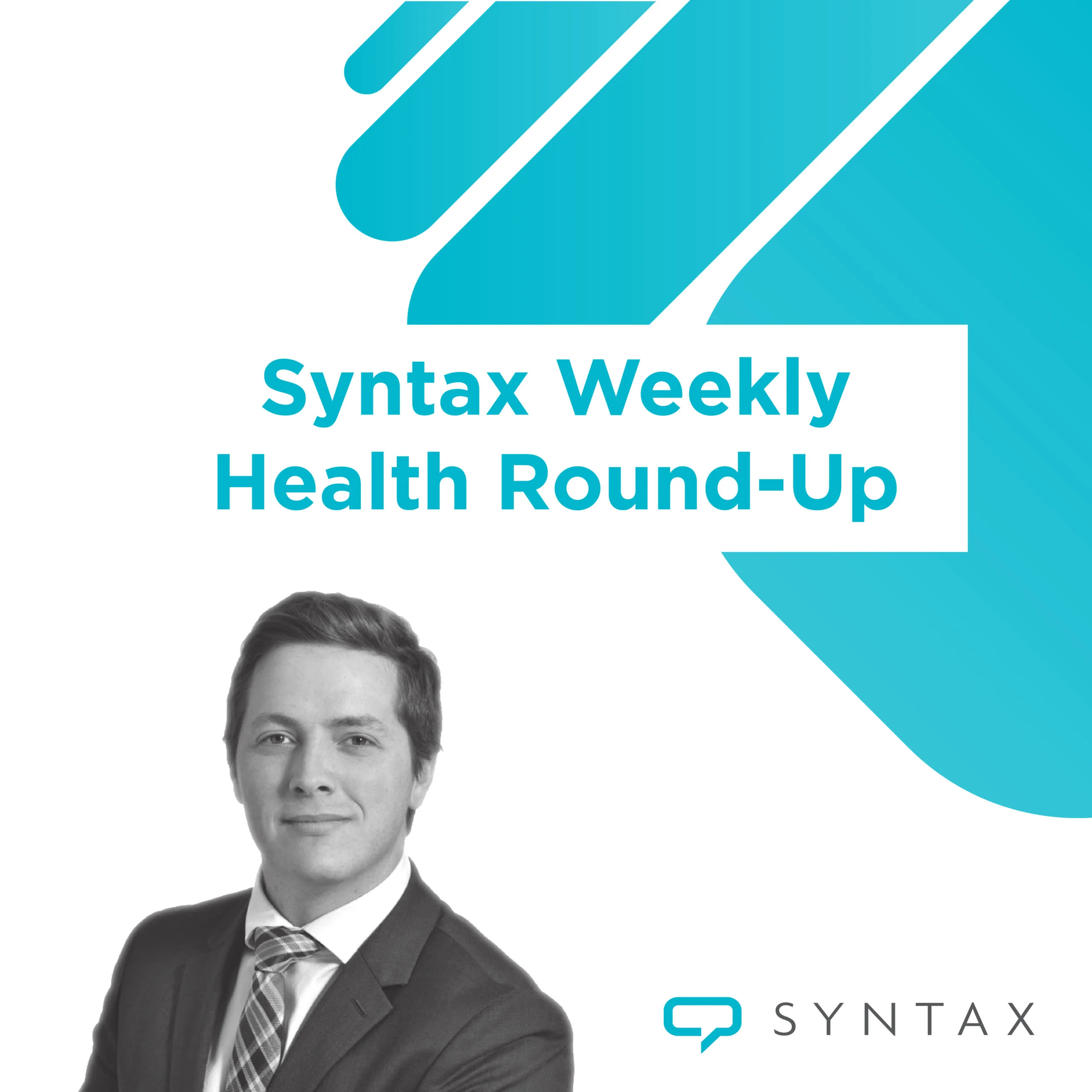Insights | Blog
Advancements on Health Workforce Issues
Minister Holland welcomes the establishment of Health Workforce Canada, and B.C. launches its new Allied Health Strategic Plan. On that, and more, here is your Syntax Weekly Health Round-Up.
On the Hill
- With the Christmas break fast approaching, the government is doing its best to get some legislative wins. The Official Opposition, meanwhile, is doing its best to disrupt the legislative agenda to increase its pressure campaign to remove the federal price on pollution. This week, they served notice of over 100 amendments to the Supplementary Estimates, forcing an estimated 24 hours worth of voting in the House of Commons. They also implemented similar tactics at the committee level, something we can expect to continue across committees in the short term.
- Meanwhile on the Hill, we continue to wait for pharmacare legislation to be tabled. Although the NDP have confirmed that they are okay with a delay into 2024, the legislation remains a critical component to the Liberal-NDP Supply and Confidence Agreement.
- At committee, the Standing Committee on Health kicked off its study on the Opioid Crisis and its study of Medicago. Next, it will return to its study of Women’s Health ahead of the Christmas break. The committee also agreed that regarding its study of the Opioid Crisis, MPs may submit their witness lists no later than December 15, and that the committee invite the Minister of Mental Health and Addictions to testify no later than February 2, 2024.
Around Government
- On the wings of International Day of Persons with Disabilities, Minister of Diversity, Inclusion and Persons with Disabilities Kamal Khera celebrated the launch of the Canadian Business Disability Network to help advance the inclusion of persons with disabilities in the workforce. The independent and self-governing network was launched by the Disability Inclusion Action Plan’s Disability Inclusion Business Council (DIBC) to address workplace barriers faced by persons with disabilities.
- As part of the government’s larger and ongoing efforts to support the health workforce, Minister of Health Mark Holland welcomed the establishment of Health Workforce Canada (HWC). HWC is a new, independent organization established with support from the Canadian Institute for Health Information (CIHI). The stand-alone entity will work closely with CIHI and all healthcare system stakeholders to improve the collection and sharing of health workforce data. This important work will help identify sectoral needs, provide insights and guidance to inform effective policy for health workforce planning, and support practical solutions to address key gaps and implementation challenges. HWC’s work will be overseen by an initial Board of Directors, including Glenda Yeates, Dr. Verna Yiu, Dr. Kimberlyn McGrail, and Dr. Linda McGillis Hall.
Around the Dominion
- The Government of Nova Scotia announced a change to how the Province employs travel nurses that will help create more stability in healthcare and increase hiring of permanent nurses in Nova Scotia. Specifically, it announced that travel nurses working for Nova Scotia Health, IWK Health, or a government-funded long-term care facility can only be hired for a maximum 180 days, at which point the nurse must wait a period of one year to be assigned to these institutions again.
- The Government of Ontario announced an investment of up to $1 million over the next two years to expand the Indigenous Primary Health Care Council’s (IPHCC) Indigenous cultural safety training program, enabling more cultural training sessions to healthcare organizations so providers can connect First Nations, Métis, Inuit, and urban Indigenous people across the province to the culturally appropriate care they need.
- The Government of Saskatchewan announced it is increasing funding to the Rural and Remote Recruitment Incentive by $3 million for 2024. So far, the incentive of up to $50,000 per employee has helped recruit 226 people for hard-to-fill positions across the province. The government has made the program is available in 54 rural and remote communities across Saskatchewan. The province also announced it is expanding access to free counselling services for children, youth, and caregivers, with support offered for challenges ranging from stress and depression to family conflict, addictions, and domestic violence.
- The Government of British Columbia launched its new Allied Health Strategic Plan (AHSP), which focuses on recruitment, retention, training, and redesigning of the allied health workforce to ensure people have access to the healthcare providers they need. The AHSP is part of and funded through B.C.’s Health Human Resources (HHR) Strategy, which outlines 70 actions that focus on four cornerstones for the workforce: retain, redesign, recruit, and train. The AHSP’s implementation over the next three to five years will include funding for bursaries in priority training programs, implementing peer support and mentorship programs, and building clinical-practice leadership and clinical-educator capacity.


